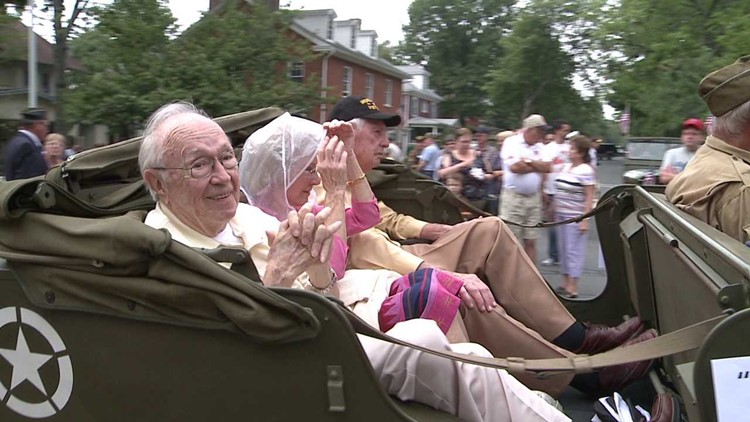The last surviving member of the crew that dropped the atomic bomb on Hiroshima has died.
Theodore “Dutch” Van Kirk was 93.
Van Kirk was a native of Northumberland. He most recently visited his hometown in September 2012 where he signed copies of his book, “My True Course: Dutch Van Kirk Northumberland to Hiroshima.”
Nearly 69 years ago, Van Kirk navigated a U.S. B-29 Superfortress called the Enola Gay over Hiroshima, Japan, on a sunny August day. Once over its target, the Enola Gay unloaded the first atomic bomb dropped in war.
A single bomb blast killed some 140,000 people and helped end World War II — and pushed the world suddenly into the nuclear era.
On Monday, Van Kirk died of natural causes at the Park Springs retirement community in Stone Mountain, Georgia, according to his eldest daughter Vicki Triplett.
His death means there are now no surviving members of the Enola Gay’s crew who, by doing their jobs, became an early and integral part in the ongoing narrative over nuclear weapons.
While in the U.S. military, Van Kirk flew dozens of missions in Europe and North Africa. Yet the history books will largely remember him and others aboard that B-29 for the morning of August 6, 1945.
By then, Van Kirk had flown about 15 missions out of England and about 10 more out of North Africa. He then returned to the United States with new orders, training “primarily to make the rapid turn and running away from the bomb,” Van Kirk recalled decades later to CNN.
They dropped the bomb dubbed “Little Boy” around 8:15 a.m.
“You didn’t see anything except a bright flash and the airplane,” Van Kirk recalled. “You saw a white cloud hanging over the city. You saw the — underneath the cloud the entire city was just entirely covered with smoke and dust, and it looked like a pot of boiling oil down there.”
His first thought when the bomb fell was “‘God, I’m glad it worked … Number two, the thoughts were, ‘This war is over.’ And that was good. That was good.'”
Three days later, another atomic bomb was dropped on Nagasaki. Japan surrendered soon after that, ending the bloody war in the Pacific and, in so doing, preventing a U.S. land invasion.
It also set the stage for what would become known as the Cold War — a nuclear arms race between the Soviet Union and United States that would go on for decades — as well as concerns about developing nuclear weaponry that persist in places like North Korea and Iran to this day.
Tom Van Kirk told CNN on Tuesday that his father “felt no regrets about” the Hiroshima mission.
At the same time, he said “Dutch” Van Kirk’s life was much more than that.
After the war, Van Kirk left the military, got his master’s degree in chemical engineering at Bucknell University, then had a long career working for DuPont. He retired in 1985 — a decade after his wife’s death — and remained active, eventually settling in Georgia near one of his daughters.
He will be buried in Northumberland alongside his wife, Tom Van Kirk said. Together, the couple had four children, seven grandchildren and three great grandchildren.
“We treasure the fact that we had my dad for 93 and a half years,” said Tom Van Kirk. “He was a great father.”
A viewing will be held from 2 to 4 p.m. and 6 to 8 p.m. Monday at the Joseph W. Epler Funeral Home, 210 King Street in Northumberland. The funeral will be conducted at 10 a.m. Tuesday in St. John’s Lutheran Church, 300 Queen Street in Northumberland, according to an obituary in The Daily Item.



